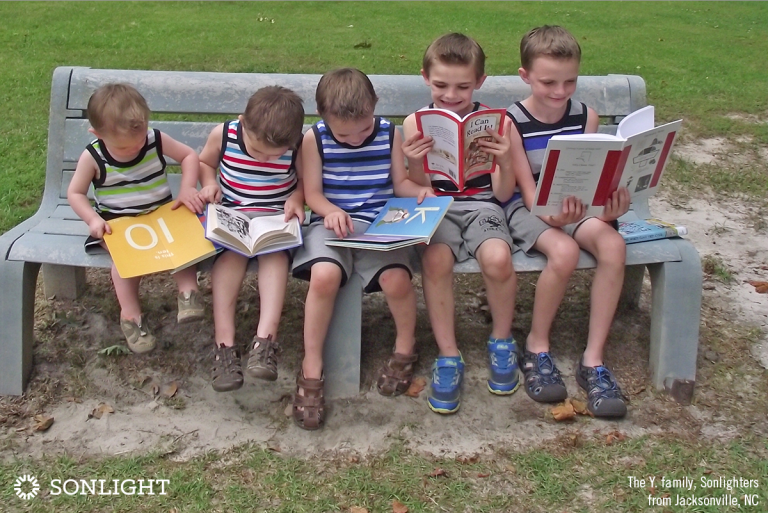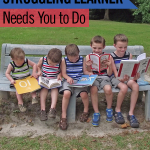
Homeschool moms are inundated with stories of student success. Even on the Sonlight blog, we highlight our Sonlight scholarship winners, but don’t tend to highlight the struggling learner.
Yet one of the great strengths of homeschooling is how it can serve students who need some extra help. Many students with learning challenges big and small prefer to homeschool, and often thrive at home in ways they just couldn’t at regular school.
If a homeschooled student needs to work two grade levels behind in reading and two levels ahead in math, that’s no problem. A student in regular school would have a hard time finding that level of customized instruction at all, much less while avoiding harmful labels from being in the “slow” class.
Continue reading below or listen here:
When you homeschool, your children get consistent one-on-one attention from adults who love them and will move mountains to get them what they need. I believe that parents who choose to homeschool children who struggle with learning are serving their students exceptionally well:
- by guarding their hearts
- by becoming their students’ tutor and advocate
- by loving them in such a practical way
How to Help the Struggling Learner
But what practical steps can you take in your homeschool to best help a struggling student? I think much of the challenge is figuring out why they are struggling. It can be hard to know if your child just needs some more time for things to click, or if they have a learning disability that would be helpful to address. When do you wait, and when do you get help?
There may not be a clear answer for you (or for children in the school system either, for that matter). But here are some tips that could help. Enjoy the benefit of having time with your child to figure out what works.
1. See a Doctor to Rule Out Physical Issues
If you suspect a problem, start first with things you can measure. Have your child’s vision and hearing tested. Work to eliminate the concrete issues. If you find out your child just needs glasses or some eye tracking therapy, you’ve discovered a relatively simple way to help them!
2. Use Special Resources and Methods
If your child is six or younger, use the Developing the Early Learner series, which comes with our Pre-Kindergarten program. These fun workbooks are specifically designed to help you identify areas that may need a little extra work, such as hand-eye coordination.
For reading struggles in particular, try these ideas:
- Try letting your child read out loud to a dog.
- Be flexible with how you use the Read-Alouds and Readers. Consider reading some of the Readers out loud to your child, or using some Read-Alouds as extra reading practice for your child. Or consider switching on and off, as your child reads one paragraph (or sentence) out loud, and then you read the next one out loud, and so forth.
- Let your children read books that are relatively easy for them to read. If every book they read is at the top range of their ability, they will get worn out and learn that reading is always a chore. Let them just enjoy the pleasure of reading a good story without having to work too hard for it.
- Consider the Remedial Reading package if you need an extra boost.
3. Connect with Other Moms
Find support, advice, and encouragement by joining the Sonlight Connections Facebook page.
4. Think Outside the Box
Find work-around solutions that could help your child learn. My friend Judy’s son struggled with fine motor skill issues from birth. She found ways to help him work around his challenges, such as teaching him to type at a young age because holding a pencil was so frustrating for him.
5. Don't Ignore the Heart
Consider that an academic struggle might be tied up with an emotional need. If your son is scared of any hint of failure, then math time might actually feel terrifying for him. You can help him process these feelings even as you help him move forward in math. And your awareness will help you respond with respect for what this experience is like for him.
6. Ask an Expert or Trusted Friend
Seek an objective evaluation when you can. Sometimes we are just too close to the situation. Ask people you trust to give you an honest evaluation of what they see in your child. Do they think your child is showing signs of anxiety, outright defiance, or a learning disability?
If you’re talking to a professional (such as your pediatrician) and they encourage you to seek intervention for your child, it can be helpful to ask, “Will this cause permanent problems if we just wait and see what happens instead?” This question can help you know if the professional sees a red flag issue that you need to address (such as a potential hearing problem), or if they just want your child to be in the middle of the bell curve of development.
And as always, our Sonlight Homeschool Advisors are here to help Sonlighters with homeschool questions big and small. You are not in this alone.
7. Research
Explore the Struggling Learners section of the HSLDA website. This resource can help you identify the difference between a typical developmental struggle and something you may need to address, such as dyslexia or an auditory processing disorder.
Read and research specific behavior and symptoms. If something strikes you as odd or potentially important, look it up. But also remember that many online searches can quickly lead you to assume the worst. This is another time when outside counsel (from your spouse or friends you respect) can help give you much-needed perspective.
8. Don't Convey Anxiety
If you’re worried about your kids, be careful not to convey your anxiety to them. I know this is easier said than done, but kids do tend to take on our worries. We want to show them that their struggle is nothing to be ashamed of, so we need to be responsible for our own feelings and not unintentionally ask them to carry our anxiety for us. (This is another time to return to our knees in prayer. Because God can help carry our burdens.)
9. Rearrange Your Priorities
Oftentimes, preserving your relationship and your child’s love of learning is more important than meeting someone else’s goal for your child. Better to have a child who loves books, loves learning, and is a year or two behind in reading than to have a child who hates it all and is only slightly less behind in reading.
10. Give Yourself Grace
And always remember that parenting, like life, is not a precise science. The bottom line is that you often won’t know if something is just a hurdle or a real learning disability. So please don’t berate yourself if you do discover a learning issue down the road. There is even debate among professionals over which learning disabilities are legitimate and which are simply labeling.
Homeschooling is Great for Struggling Learners
When a concern arises, seek counsel from friends or trusted health care professionals and pray for wisdom. Take encouragement in knowing that you love your child and have their best interest at heart. Your one-on-one teaching/tutoring will allow you the freedom to research issues, try different approaches, and keep seeking when others might give up.
You will figure things out as you go. For an example of what this can look like in real life, a friend of mine wrote this last week about her 7-year-old son:
”I have a child who is way ahead in reading but truly detests handwriting practice.
”I saw it first as just a character issue (sometime we have to do what we don’t like and do it without complaining), but realized in addition to character building, it was helpful to think about the developmental needs and the psychological ones as well.
”For him, we have to work on it from a developmental standpoint (keep strengthening those muscles) but also his drive for perfectionism and fear of failure. What’s funny is that the solutions thus far would probably be the same either way. We have tried to take it back to basics as much as we can and develop lots of successes and work VERY slowly and incrementally.
”And—just as a funny note—you never know what might motivate your child. My son read in Story of the World that Charlemagne only learned how to form letters near the end of his life, so my son told me today that his handwriting is already better than one of the great rulers of an empire. Ha! #historybuffkid”
Be encouraged that God knows your children inside and out, and knows the plans he has for them. As we are faithful to our relationship with our children and seek to help them learn, God will grant us the wisdom we seek. God will be with you and your family every step of this journey.







